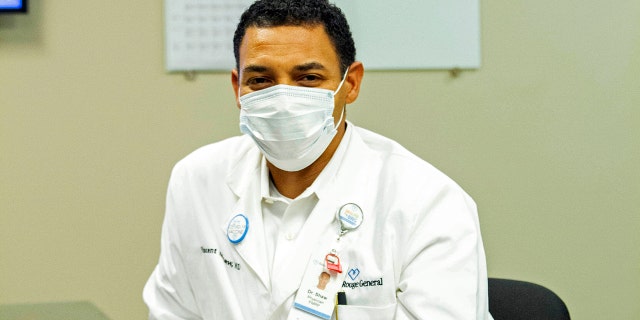

Fox News Flash top headlines for October 4
Fox News Flash top headlines are here. Check out what’s clicking on Foxnews.com.
The COVID-19 patient’s health was deteriorating quickly at a Michigan hospital, but he was having none of the doctor’s diagnosis. Despite dangerously low oxygen levels, the unvaccinated man didn’t think he was that sick and got so irate over a hospital policy forbidding his wife from being at his bedside that he threatened to walk out of the building.
Dr. Matthew Trunsky didn’t hold back in his response: “You are welcome to leave, but you will be dead before you get to your car,’” he said.
Such exchanges have become all-too-common for medical workers who are growing weary of COVID-19 denial and misinformation that have made it exasperating to treat unvaccinated patients during the delta-driven surge.
The Associated Press asked six doctors from across the country to describe the types of misinformation and denial they see on a daily basis and how they respond to it.
They describe being aggravated at the constant requests to be prescribed the veterinary parasite drug Ivermectin, with patients lashing out at doctors when they are told that it’s not a safe coronavirus treatment. An Illinois family practice doctor has patients tell him that microchips are embedded in vaccines as part of a ploy to take over people’s DNA. A Louisiana doctor has resorted to showing patients a list of ingredients in Twinkies, reminding those who are skeptical about the makeup of vaccines that everyday products have lots of safe additives that no one really understands.
Here are [some of] their stories:
LOUISIANA DOCTOR: ‘Just stop looking at Facebook’
When patients tell Dr. Vincent Shaw that they don’t want the COVID-19 vaccine because they don’t know what’s going into their bodies, he pulls up the ingredient list for a Twinkie.

Sept. 29, 2021: Dr. Vincent Shaw poses for a portrait in Baton Rouge, La. He commonly hears patients tell him they haven’t done enough research on the COVID-19 vaccines. Rest assured, he tells them, the vaccine developers have done their homework.
(AP Photo/Dorthy Ray)
“Look at the back of the package,” Shaw, a family physician in Baton Rouge, Louisiana. “Tell me you can pronounce everything on the back of that package. Because I have a chemistry degree, I still don’t know what that is.”
He also commonly hears patients tell him they haven’t done enough research about the vaccines. Rest assured, he tells them, the vaccine developers have done their homework.
Then there are the fringe explanations: “They’re putting a tracker in and it makes me magnetic.”
Another explanation left him speechless: “The patient couldn’t understand why they were given this for free, because humanity in and of itself is not nice and people aren’t nice and nobody would give anything away. So there’s no such thing as inherent good nature of man. And I had no comeback from that.”
People who get sick with mild cases insist that they have natural immunity. “No, you’re not a Superman or Superwoman,” he tells them.
He said one of the biggest issues is social media, as evidenced by the many patients who describe what they saw on Facebook in deciding against getting vaccinated. That mindset has spawned memes about the many Americans who got their degrees at the University of Facebook School of Medicine.
“I am like, ‘No, no, no, no, no.’ I shake my head, ‘No, no. That is not right, no, no. Stop, stop, just stop looking at Facebook.’”
DALLAS ER DOCTOR: Baffled at how he’s ‘lost all credibility’ with anti-vaccine patients
Dr. Stu Coffman has patients tell him they are scared about vaccine side effects. They don’t trust the regulatory approval process and raise disproven concerns that the vaccine will harm their fertility. He said the most unexpected thing someone told him was that there was “actually poison in the mRNA vaccine” — a baseless rumor that originated online.
He is confounded by the pushback.
“If you’ve got a gunshot wound or stab wound or you’re having a heart attack, you want to see me in the emergency department,” he said. “But as soon as we start talking about a vaccine, all of a sudden I’ve lost all credibility.”
He said the key to overcoming hesitancy is to figure out where it originates. He said when people come to him with concerns about fertility, he can point to specific research showing that the vaccine is safe and their issues are unfounded.
But he says there’s no hope in changing the minds of people who think the vaccines are laced with poison. “I’m probably not going to be able to show you anything that convinces you otherwise.”
And he thinks he could change people’s minds about the vaccine if they could follow him around for a shift as he walks past the beds of the sick and dying, almost all of whom are unvaccinated.
Source: Read Full Article